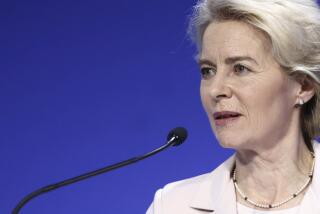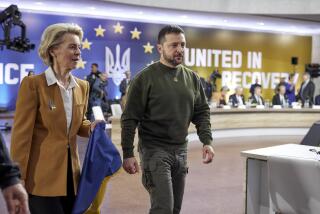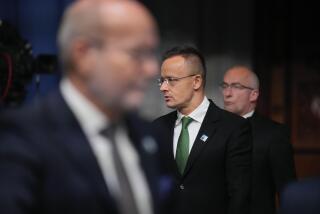European Community Gears Up for Serbia Sanctions
- Share via
BRUSSELS — Mid-level European Community officials, feeling the sting of U.S. Secretary of State James A. Baker III’s recent criticism, began the process Tuesday of punishing Serbia with a range of economic and other sanctions, from imposing an oil embargo to barring Serb-led Yugoslavia from international sports events.
The sanctions, which must still percolate up two more layers of the EC’s decision-making apparatus, would take effect no earlier than next week, after foreign ministers from the 12 EC nations have reviewed them.
The procedures left impatient Americans shaking their heads. “After every meeting, they say the next meeting will be the decisive one,” one U.S. diplomat said.
Baker had complained in Lisbon two days earlier about “anyone who is looking for reasons not to act” to punish Serbian aggression against its neighbors in the crumbling Yugoslav federation, in which only Serbia and Montenegro remain. He said he would be encouraged if, “coming out of the meeting on Tuesday, there were a willingness on the part of my European colleagues to act.”
The sanctions discussed at Tuesday’s meeting included a full trade embargo, including oil. But the EC officials acknowledged that their 12 nations account for only 12% of Serbia’s oil, far behind China and Russia (22% each). An embargo would be effective, they said, only if those countries participated or if Serbia’s ports and oil pipelines were blocked.
Representatives of France and other EC nations suggested that economic sanctions should await U.N. authorization because only then would they be effective.
The EC officials also held out the possibility of freezing financial transactions with Serbia, breaking off scientific and technological cooperation and blocking air, rail, boat and highway transportation into and out of the country.
Wire services reported Tuesday from Belgrade that Serbia’s foreign minister rejected Western criticism of his republic’s role in the fighting in Bosnia-Herzegovina and said an economic boycott would only cause more bloodshed.
“The West has miscalculated and involved itself in a hellish policy,” Foreign Minister Vladislav Jovanovic said.
“Serbia is not an aggressor,” he said in an interview with the Associated Press. “By isolating Serbia, the West could also isolate the possibility of peace and stability in the region.”
Jovanovic said Serbia has no control over Serbian irregulars in Bosnia. He criticized their attacks on the cities of Sarajevo and Mostar, and he called for an immediate halt to the fighting.
Sarajevo, the Bosnian capital, was relatively quiet during the day, but as night fell, Serbian artillery shelled the city’s maternity hospital, Croatian Radio said. It had no word on casualties.
Warring Serb and Muslim-Croat forces agreed Tuesday to reopen Sarajevo’s airport for emergency aid to the blockaded city, Russian Foreign Minister Andrei V. Kozyrev and Bosnian leaders said.
More to Read
Sign up for Essential California
The most important California stories and recommendations in your inbox every morning.
You may occasionally receive promotional content from the Los Angeles Times.










